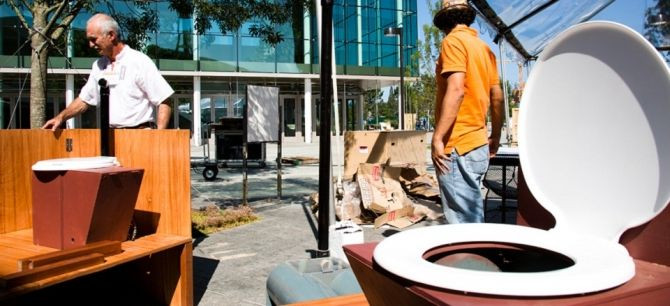The Toilet of the Future Doesn't Need Water, Runs on Sunshine

The toilet is an invention that has remained unchanged for the majority of its two-century history. The Bill and Melinda Gates Foundation wants to change that.
On Sunday, Monday and Tuesday the Foundation hosted the Reinvent the Toilet Fair in Seattle. The goal was to create a hygienic toilet that uses little to no water, can operate on five cents or less a day, can transform waste into energy, nutrients, and water and, perhaps most importantly, is safe.
The issue of the toilet goes unnoticed for many of us, but it is in fact unsustainable, impractical, and unaffordable for 40 percent of the world. In many parts of the world, as many as 1.2 billion people practice what the United Nations describes as "open defecation" – expelling wastes in bushes, plastic bags, or on railroad tracks. That practice can be especially humiliating for women and girls, who are sometimes targeted as a result. About 1 billion other people use pit latrines. According the statement issued by the Foundation, "Food and water tainted with fecal matter causes diarrheal diseases that kill 1.5 million children every year - more than the annual deaths from AIDS and malaria combined."
The Millennium Development Goals (MDGs) have targeted sanitation, waste, and water, among other things, as public health concerns that need fixing by 2015. While we have drastically increased the number of people with access to clean drinking water, and have reached the goal already, well ahead of the MDGs, sanitation and hygiene lags behind. This is especially upsetting because a solid chunk of the issues with the water supply in many parts of the world are related to sanitation and hygiene. Cholera, for example, is spread predominantly through human waste making its way into drinking water.
The competition ended with awards for three universities. The foundation said in its statement that "first place [went] to California Institute of Technology in the United States for designing a solar-powered toilet that generates hydrogen and electricity, second place to Loughborough University in the United Kingdom for a toilet that produces biological charcoal, minerals, and clean water, and third place to University of Toronto in Canada for a toilet that sanitizes feces and urine and recovers resources and clean water. A special recognition was awarded to Eawag (Swiss Federal Institute of Aquatic Science and Technology) and EOOS for their outstanding design of a toilet user-interface."
The Foundation hopes the fair will be a positive step toward solving an important public health concern.
Published by Medicaldaily.com



























